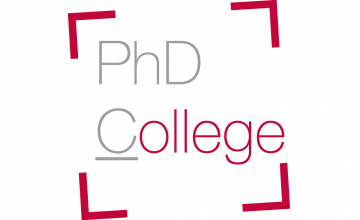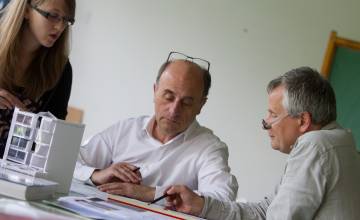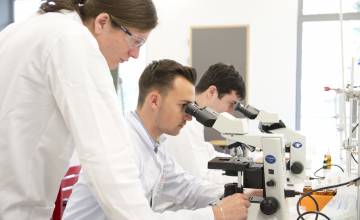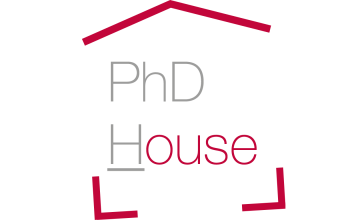
PhD College
-
 The PhD College is the coordination body for activities linked to the PhD, offering to Phd Students and their promotors visibility and place of expression.
The PhD College is the coordination body for activities linked to the PhD, offering to Phd Students and their promotors visibility and place of expression. -

Board
The Board sits Four times per annum and has representation from the research student body, senior researchers, senior management, research institute leaders and academic staff across all faculties and schools of the University -

PhD
In doing a PhD at UMONS, you will be integrated into one of our multidisciplinary research institutes. Here, you will benefit from the varied perspectives that this environment can provide and will enrich your own approach towards your subject of interest. -

Support and funding of research
The UMONS’ Knowledge Transfer Office (AVRE) provides researchers and future researchers at UMONS with professional resources dedicated to the development of research and innovation. The AVRE team helps the researchers to find financing for their projects, helps them to prepare their project proposals and with technology transfer. AVRE can advise you and answer any questions you may have during your research activities at UMONS. At the same time, the research council of UMONS supports research with a series of actions. -

Futur PhD Student at UMONS ?
Are you interested in a career as researcher ? Would you like to start it by doing a PhD at UMONS? Discover here an indicative list of research topics available within our 10 Research Institutes: Search a thesis topic -

PhD House
Under the aegis of PhD College, the PhD House is a place, a space, made available to PhD students and their promoters, concretizing the existence of their community within UMONS. But much more than a place, the PhD House, in collaboration with "PhD College", will offer PhD students the opportunity to initiate and manage their own projects. -

Cross-disciplinary Courses
A database lists all the cross-disciplinary courses organised by UMONS. These courses cover 6 themes and are designed to help PhD students and researchers strengthen her soft skills.
Popular links
Contact person
They talk about it better than us
What are your motivations? As an engineering student, I was always interested in discovering[ND1] the newest applications in global energy solutions. To date, no optimal …Continue reading Diederik Coppitters (en) ( PhD FRIA mandates )Faculty of Engineering
Diederik Coppitters (en) ( PhD FRIA mandates )Faculty of Engineering
What are your motivations?
As an engineering student, I was always interested in discovering[ND1] the newest applications in global energy solutions. To date, no optimal energy solution has been provided. By doing this PhD on renewable energy, I can independently investigate the potential of the newest energy applications and provide first-step contributions towards a sustainable energy mix, in order to restrain climate change.
How would you explain your project to non-experts?
A hydrogen system is a viable energy storage solution that uses excess energy to split water into hydrogen and oxygen, and reuses this hydrogen to produce energy when the demand is high. When such a hydrogen system is installed, it should achieve optimal economic, environmental and social objectives. All these objectives can be predicted in simulation models, but in real life, the outcome can be completely different. This can have serious consequences, such as unexpected costs, leading to early project failure. Therefore, I will model and include uncertainties on all the parameters that are related to these objectives. Due to these uncertainties, no single, unreliable outcome will be provided, but instead, a distribution of outcomes for each design will be determined.
What can your research bring to society/science ?
In the Netherlands in 2014, a set of recently installed combined cycle gas turbines were shut down because they were not economically viable anymore. This project failure was induced as a result of not considering the uncertainty of the natural gas price. This research project will provide robust designs of hydrogen-based renewable energy systems which are less sensitive to real-life uncertainties. This will result in reliable, high-quality performance of the systems, with a minimum chance of project failure.
Thesis topic : robuST design Optimization of hydrogen-based hybrid RenewAble enerGy systEms – STORAGE
Promoter : Ward DE PAEPE (Thermal Engineering and Combustion unit)
 Diederik Coppitters (en) ( PhD FRIA mandates )
Diederik Coppitters (en) ( PhD FRIA mandates )
What are your motivations? What has motivated me is continuing my studies and going further in my field, all the while working quite independently and developing a project…Continue reading Laurie-Anne Lamotte (en) ( PhD FRIA mandates )Faculty of Science
Laurie-Anne Lamotte (en) ( PhD FRIA mandates )Faculty of Science
What are your motivations?
What has motivated me is continuing my studies and going further in my field, all the while working quite independently and developing a project that will make a valuable contribution to science.
How would you explain your project to non-experts?
Proteins, sometimes referred to as “the small hands” of the cell, perform most of the cellular functions. There is a cellular system that can label proteins, to determine if they will have to be moved, discarded, activated, and so on. This very important labelling system is called the “ubiquitin-proteasome system”. This system is particularly targeted by viral proteins during cell infection. Indeed, these viral proteins can interact with this system and hijack it to promote virus replication. In my thesis, I will focus on the interactions between this ubiquitin-proteasome system and a protein of the Influenza virus.
What can your research bring to society/science ?
The Influenza virus is responsible for annual epidemics and has already caused serious pandemics. It has the ability to mutate very easily, which makes its evolution unpredictable. This project will provide a better understanding of the infection mechanisms of the Influenza virus.
Thesis topic : Identification and characterisation of interactions between Influenza A virus NS1 protein and the human ubiquitin-proteasome system – Ubiquitination targeted by Influenza NS1
Promoter : Lionel TAFFOREAU (Cell Biology unit)
 Laurie-Anne Lamotte (en) ( PhD FRIA mandates )
Laurie-Anne Lamotte (en) ( PhD FRIA mandates )
What are your motivations? I have always been interested in science, and particularly health sciences. When I was a child I wanted to be a neurologist, but being a resear…Continue reading Anthony Procès (en) ( PhD - Biomedical sciences FRIA mandates )Faculty of Medicine, Pharmacy and Biomedical Sciences
Anthony Procès (en) ( PhD - Biomedical sciences FRIA mandates )Faculty of Medicine, Pharmacy and Biomedical Sciences
What are your motivations?
I have always been interested in science, and particularly health sciences. When I was a child I wanted to be a neurologist, but being a researcher seduced me. I now dream about achieving something important that could help the scientific community and contribute to the general knowledge about human beings.
How would you explain your project to non-experts?
My research project focuses on the study of neuron lesion mechanisms, and more particularly of axons, which transmit nerve impulses. My work focuses on the traumatic lesions resulting from a concussion. For example, during a car accident, the head is subject to an inertial shock, an acceleration and a sudden deceleration of the head, causing a deformation of the brain tissue, which causes lesions on the neurons and their axons.
As part of my project, I developed an electromagnetic gun capable of simulating trauma by propelling slices of the hippocampus, the structure of the brain which plays an important role in memory and space navigation, at more than 45 km/h. In parallel, I study the deformation of a network of neurons whose cell architecture is controlled by stretched elastic membranes and coupled with stretchable microelectrodes. By stretching the membrane, it allows me to simulate the deformation that occurs during a traumatic brain injury and study the molecular and electrophysiological consequences. In addition, the purpose of this project is to create a neurochip that will allow the systematic study of traumatic brain injury.
What can your research bring to society/science ?
The development of these two models will make it possible to approach traumatic brain lesions more appropriately. In addition, the development of the neurochip can enable the systematic study of traumatic brain lesions on a robust and reproducible in vitro model? thus allowing the reduction of animal laboratory use without reducing the value and relevance of the results obtained. The development and study of such models could facilitate the understanding of the mechanisms underlying traumatic brain injury, and this knowledge could be useful in clinical practice.
Thesis topic : Study of the molecular mechanisms of diffuse axonal injury in an in vitro traumatic brain injury model – Study of Diffuse Axonal Injury (SODAXI)
Promoters : Laurence RIS (Neurosciences) Sylvain GABRIELE (Interfaces and Complex Fluids)
 Anthony Procès (en) ( PhD - Biomedical sciences FRIA mandates )
Anthony Procès (en) ( PhD - Biomedical sciences FRIA mandates )
At the end of my Bachelor’s in Business Engineering at UMONS, I had the opportunity to carry out a research initiation internship. This one-month internship allowed me to discover what research was an…Continue reading Tristan Caballero-Montes (en) ( PhD FRESH mandates )Warocqué School of Business and Economics
Tristan Caballero-Montes (en) ( PhD FRESH mandates )Warocqué School of Business and Economics
At the end of my Bachelor’s in Business Engineering at UMONS, I had the opportunity to carry out a research initiation internship. This one-month internship allowed me to discover what research was and what doing a PhD entailed. Furthermore, it gave me my first contacts with microfinance, a sector that I very quickly learnt to love, both for its financial and social aspects. The possibility of my carrying out a PhD centred on microfinance was therefore developed in advance, during my Master’s, which allowed my supervisors and I to get the odds on our side in order to apply for a doctoral scholarship, that we eventually got!
Nowadays, 2 billion people have no access to services considered traditional in more developed countries (savings, credit, insurance, remittances, etc.), and more than 700 million people currently live in extreme poverty. Microfinance institutions offer financial services to these poor and excluded people, mainly in developing countries. The goal of my research project is to understand how microfinance regulation can ensure that this sector fulfils its financial inclusion role while being financially sustainable. In microfinance, formal regulation and the influence of competition are often perceived as dominant regulation modes. However, they are generally considered in a kind of disconnected way, without taking their important interactions into account, inducing potentially harmful consequences for the sector. First, this project aims to understand what the interactions are between these regulation modes: how to consider market structure when implementing optimal regulatory measures? Then, my research is also interested in self-regulation, especially regarding professional associations and the self-regulatory role they play in the industry: how to strengthen microfinance’s financial inclusion mission without jeopardizing its financial sustainability?
Thesis topic : How can microfinance be regulated in order to secure its financial and social sustainability? – Regulation of the microfinance sector
Promoters : Marc LABIE – Cécile GODFROID (Economics and Business Management unit)
 Tristan Caballero-Montes (en) ( PhD FRESH mandates )
Tristan Caballero-Montes (en) ( PhD FRESH mandates )
Since my first year on the Bachelor’s course my goal was to become a researcher, and this desire was confirmed during my Master’s dissertation. At the end of it, I wanted to pursue my academic career …Continue reading Denis Dumont (en) ( PhD FRIA mandates )Faculty of Science
Denis Dumont (en) ( PhD FRIA mandates )Faculty of Science
Since my first year on the Bachelor’s course my goal was to become a researcher, and this desire was confirmed during my Master’s dissertation. At the end of it, I wanted to pursue my academic career by starting a doctoral thesis. My research focuses on granular matter (sands, cereals, powders, etc.), which, after water, is the second most abundant material on Earth. It can be found in numerous fields, such as the building, agri-food, and pharmaceutical industries, and in geophysics. Despite their large use, the present understanding of the physical mechanisms governing these materials remains poor. The main goal of my thesis is to get a better understanding of the flow properties of these granular materials. This could lead to the development of more efficient industrial devices, or could help to accurately rationalize geophysical events, such as landslides or rock avalanches.
Thesis topic : Rheology of granular materials – RGM
Promoter : Pascal DAMMAN (Interfaces and Complex Fluids unit)
 Denis Dumont (en) ( PhD FRIA mandates )
Denis Dumont (en) ( PhD FRIA mandates )
The production of electricity, and our consumption of it, have to be perfectly balanced. If we consume more electricity, we have to “turn up” the power plants. If the power plants produce too much ele…Continue reading Cédric Devriese (en) ( PhD FRIA mandates )Faculty of Engineering
Cédric Devriese (en) ( PhD FRIA mandates )Faculty of Engineering
The production of electricity, and our consumption of it, have to be perfectly balanced. If we consume more electricity, we have to “turn up” the power plants. If the power plants produce too much electricity, we need to “turn them down”. In the past, nuclear power stations produced a fixed amount of electricity to take care of the constant part of our electricity consumption, this is called the “base load”. Any increase above the base load, for instance when we all turn on the lights and our coffee machines in the morning, was taken care of by fossil fuelled power plants, which can vary the amount of electricity they produce (unlike nuclear power plants).
These days, nuclear power plants still take care of the base load. However, more and more fossil fuelled power stations are being closed, and more and more renewable energy sources, like wind turbines and solar panels, are producing electricity. As we cannot control the wind and sun, we cannot control the amount of electricity they produce at a given time. This means that the wind turbines and solar panels sometimes produce more electricity than we need, and, since export possibilities are limited, this electricity is often wasted.
Instead of wasting this excess electricity, we can store it and use it later when we need it. Hydrogen is one of the ways in which we can store energy. By using this excess electricity, we can split water into hydrogen and oxygen (by a process called electrolysis) and store the hydrogen gas for later use.
We can use this hydrogen to produce electricity and heat locally in a specific machine, a gas turbine. This gas turbine is like the engine of an airplane, but smaller. It can provide 100 kW of electrical energy and 150 kW of heat energy, enough to provide about 10 homes with all the heat and electricity they require. The design of such a small hydrogen fuelled gas turbine is the subject of my doctoral research.
Thesis topic : Hydrogen fuelled mGT optimisation: CFD design and optimisation of compressor-combustor-turbine system – H2GO
Promoter : Ward DE PAEPE (Thermal Engineering and Combustion unit)
 Cédric Devriese (en) ( PhD FRIA mandates )
Cédric Devriese (en) ( PhD FRIA mandates )
Since my childhood, I have always been very curious and interested in understanding how things work. When I first studied human biology in high school, I was fascinated and eager to learn more about h…Continue reading Thuy-Hang Nguyën (en) ( PhD FRIA mandates )Faculty of Medicine, Pharmacy and Biomedical Sciences
Thuy-Hang Nguyën (en) ( PhD FRIA mandates )Faculty of Medicine, Pharmacy and Biomedical Sciences
Since my childhood, I have always been very curious and interested in understanding how things work. When I first studied human biology in high school, I was fascinated and eager to learn more about how the human body functions. Therefore, I decided to study biomedical science at UMONS. Motivated by my passion for science, as well as by the fact that I want my work to have meaning, I have committed myself to pursuing my scientific training as a PhD student. Indeed, science is certainly interesting, but it is also a tool for the benefit of mankind.
My PhD project focuses on facioscapulohumeral dystrophy (FSHD), a hereditary myopathy (muscle disease), which currently has no effective treatments. As suggested by its name, FSHD progresses from the upper to the lower part of the body, firstly affecting the facial muscles (facio), and then the shoulder (scapulo) and arm muscles (humeral). Around 15-20 % of affected patients present abdominal and leg muscle disabilities. These patients have major walking difficulties and require the use of wheelchair.
The causative gene of this disease has been identified as the DUX4 gene. This gene is normally expressed during embryogenesis. Its inappropriate expression in adult muscle is at the base of the pathology. However, the cellular and molecular mechanisms by which its expression leads to muscle weakness are still unknown. The overall goal of my thesis will be to further characterize these different mechanisms. In collaboration with a team at King’s College London, our aim is to identify the pathological process of the pathology. Through this project, we hope to open new prospects for therapeutic strategies.
Thesis topic : Study of DUX4-HIF1α cross-talk and metabolic consequences on FSHD muscle – DUX4HIF1 in FSHD
Promoters : Alexandra TASSIN (Physiology and Pulmonary Rehabilitation unit) – Anne-Emilie DECLEVES (Molecular Biology unit)
 Thuy-Hang Nguyën (en) ( PhD FRIA mandates )
Thuy-Hang Nguyën (en) ( PhD FRIA mandates )

